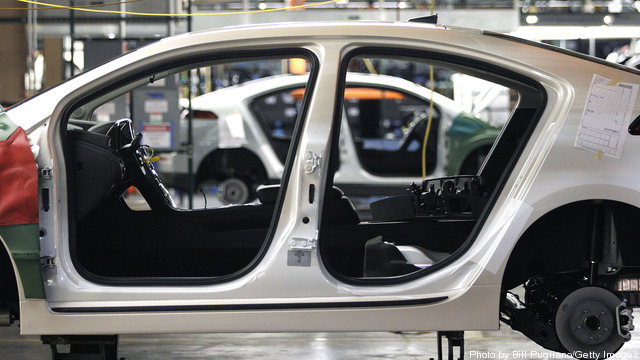
You might fear for the future of any car whose battery sparked, smoldered, or burst into flames during government safety tests.
That’s what happened to the Chevy Volt, a plug-in electric/gasoline hybrid touted as GM’s leading response to popular demand for cars that consume less gasoline and emit fewer greenhouse gases than the automaker’s thirstier conventional models.
Damage to its battery was blamed for a fire in the vehicle in May 2011, three weeks after the National Highway Traffic Safety Administration crashed the car in a test designed to measure its ability to protect passengers from a side-impact collision.
In November, the government lab found a “temporary increase in temperature” in another test that deliberately damaged the battery. A battery used in another test in similar conditions caught fire, prompting a “forensic analysis” by the NHTSA, which on the day after Thanksgiving announced an ongoing investigation into the batteries.
The Political Firestorm
The highly publicized battery fires were seized by conservative commentators — already fired up over the bankruptcy of the federally supported solar-panel maker Solyndra — as evidence that the Volt in particular, and perhaps electric cars in general, are an unsafe, costly and impractical proposition that are unworthy recipients of $7,500 per vehicle in federal tax credits.
U.S. Republican Congressman Mike Kelly of Pennsylvania wrote in USA Today that the federal government has “no business” subsidizing a project that could be promoted by the manufacturer through rebates and other incentives, and mostly favors the affluent few who can afford $40,000 for a Volt or $97,000 for a Fisker Karma – a Finnish model scheduled for manufacture in Delaware.
The Volt’s backers characterize the fires as a modest setback rather than a disaster, and predict they will result in batteries being protected against any real-world crashes, along with a possible recall of the approximately 6,000 Volts now on the road.
“There is nothing about these fires that represents an insurmountable technological challenge,” said Clarence Ditlow, executive director of the Washington, DC-based Center for Automobile Safety, a non-governmental organization that led a campaign for the 1978 recall of the Ford Pinto because of concerns about the safety of its gas tank.
A Recall Looms
Ditlow predicted GM will recall the Volt at a relatively modest cost because of the small number on the road, and then re-engineer the battery so that it discharges in a crash, while encasing it in a protective steel cage, as in the all-electric Nissan Leaf, a rival model.
There is no fundamental problem with the Volt’s lithium ion batteries which also power laptop computers, Ditlow argued, but they were put in the car without ensuring their safety under crash conditions. “They didn’t do enough testing to have a reliable and safe vehicle,” he said.
By contrast, the Leaf’s batteries are surrounded by an airtight steel case, enabling them to survive the destruction of some of the cars during the Japanese tsunami in March 2011, and remain intact without catching on fire.
Willett Kempton, a University of Delaware professor who leads a pioneering program to connect unused energy from car batteries to the grid, said lithium ion batteries are safe but should be checked and discharged if damaged in a crash.
Utilities and electricity industry suppliers have responded to the impending potential arrival of widespread electric vehicle usage with divergent strategies, ranging from panic to investment in new charging capacity. Read More Electric Vehicle Coverage on Breaking Energy here.
“There is some fire hazard from lithium batteries which can be mitigated or nearly eliminated by engineering and post-collision handling,” Kempton wrote in an email. “In my judgment, automotive Li-ion batteries are already safer than gasoline and will continue to become even safer.”
There was a similar vote of confidence from Barclays Capital, where analysts predicted in mid-December that the Volt fires would have little effect on demand for “premium” electric cars such as Tesla Motors forthcoming all-electric Model S, the bank said.
GM, which has provided loaner cars for only around 30 worried Volt owners while tests proceed, said all the incidents had taken place in tests and none had been experienced under “real-world” conditions.
